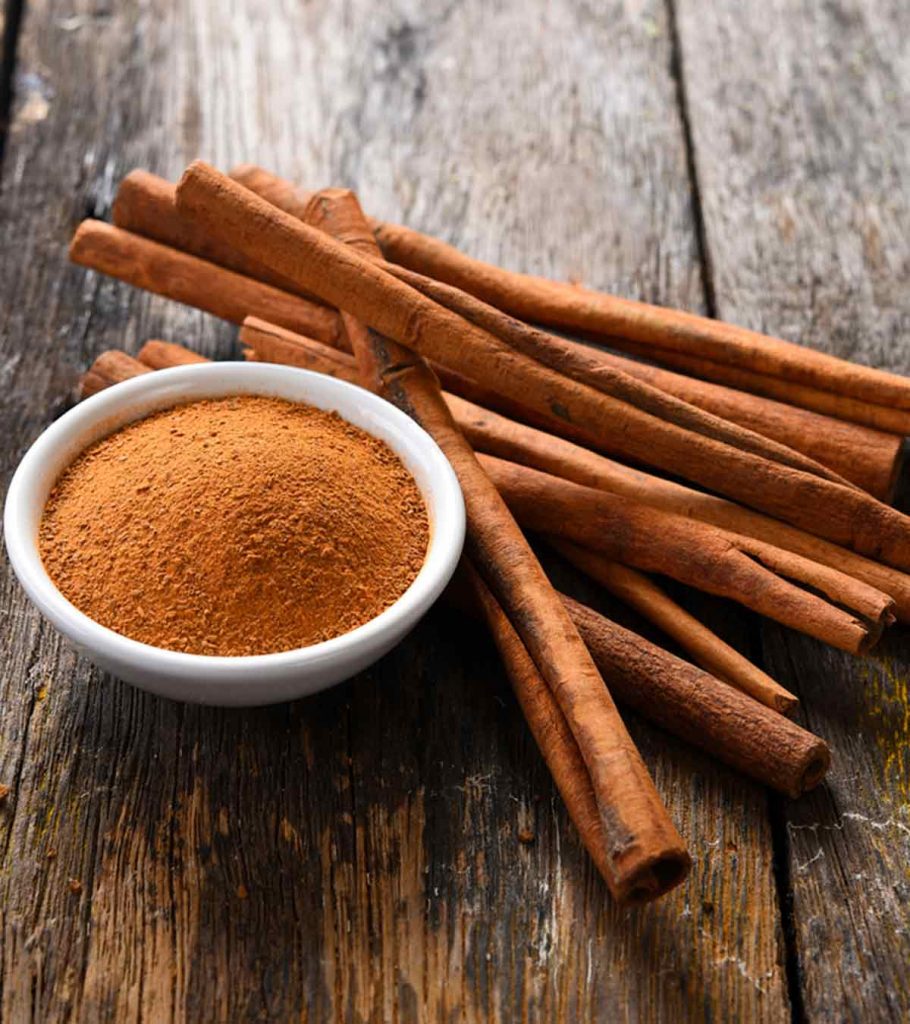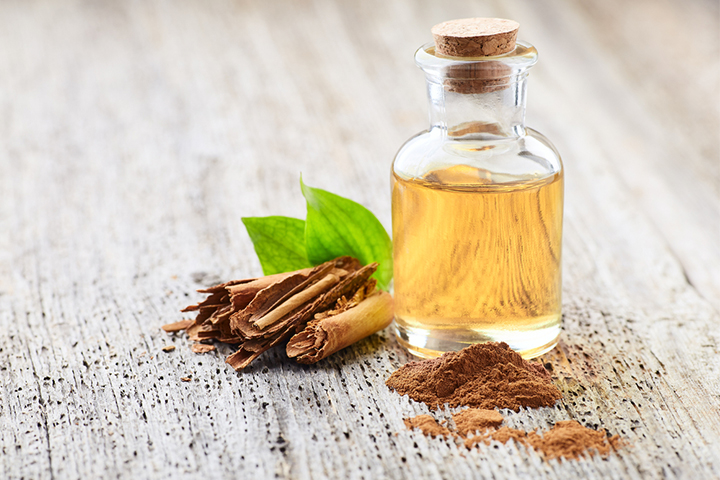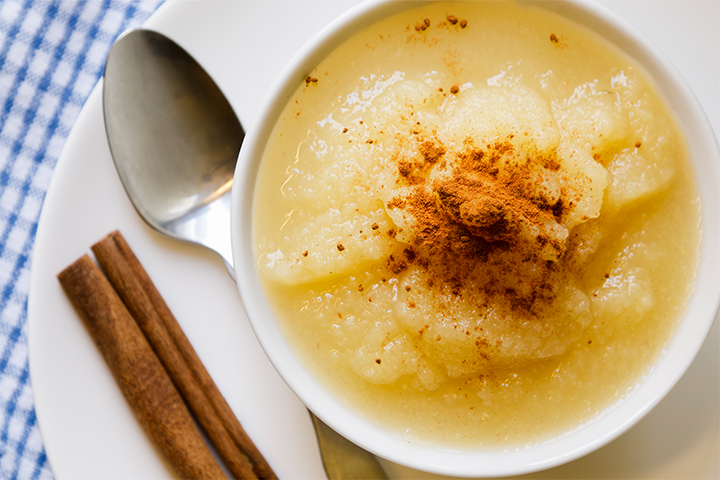Cinnamon is a versatile medicinal plant that has various health benefits. Though it is beneficial for adults, the safety and benefits of cinnamon for babies should be considered before including it in their diet.
The bark of the cinnamon tree is the most commonly used part and is infused into many sweet and savory dishes as a spice. However, almost all of its parts, including the flowers, leaves, and roots, are edible and have therapeutic value.
Read this post to understand more about the safety, benefits, and adverse effects of cinnamon on babies and how to include it in their diet.
Is Cinnamon Safe For Babies?
The U.S Food and Drug Administration considers cinnamon as “Generally Recognized As Safe” (GRAS) for consumption among babies (1). Anecdotal evidence suggests that one teaspoon of cinnamon powder a day should be safe to consume for babies who are at least six months old.
When Can Babies Have Cinnamon?
The American Academy of Pediatrics recommends using cinnamon for babies once they are six months of age (2). If you wish to introduce cinnamon before the age of six months, then consult your pediatrician.
Health Benefits Of Cinnamon For Babies
Several studies in animals and humans demonstrate that cinnamon can be helpful in boosting cognitive function (3) (4). Below are some probable health benefits that cinnamon can provide to babies.
- Immune function: Babies are more vulnerable to infections than older kids and adults. The use of cinnamon to support immunity has been a common practice in alternative medicine, especially for babies.
A research study showed that the aqueous extract of the cinnamon spice contains cinnamaldehyde that has been attributed to antioxidant properties (5).
- Cognitive function: Cinnamon contains phytochemicalsiXChemical substances produced by plants that help lower the risk of diseases and provide health benefits to the body. that boost the brain’s ability to utilize glucose (6). Adequate and prolonged use of cinnamon might help boost cognitive development among babies.
- Generalized pain: Cinnamon is believed to possess antioxidant and anti-inflammatory properties that could potentially help reduce soreness and pain. This property of cinnamon has made it a popular alternative medicine to treat dental problems (7). However, before using any home remedy, consult a pediatrician.
- Common cold and flu:The use of cinnamon to get some symptomatic relief from cold and flu is common in alternative medicine. A cup of cinnamon tea with one teaspoon of honey is considered as an effective treatment for cold (8). However, honey is not safe for babies below the age of 12 months (9).
- Digestive health: The use of cinnamon in traditional medicine to treat digestive issues is well documented. The common digestive ailments for which the use of cinnamon was recommended were indigestioniXA common gastric disorder causing abdominal pain, bloating, or discomfort, especially after consuming food., flatulenceiXReleasing gas from the digestive tract through the back passage (rectum)., abdominal cramps, and intestinal spasmsiXA condition marked by a sudden contraction of the muscles, causing pain in the abdominal region. (10). Anecdotal evidence reaffirms the effectiveness of cinnamon to provide symptomatic relief from the mentioned ailments. However, the safety of use for babies is not well researched.
- Dental Care: In traditional medicine, cinnamon oil has been used to treat various dental issues. This practice is now validated by some recent research studies that indicate that cinnamon might prove helpful in maintaining dental health (11) (12). However, the use of cinnamon for babies for oral care is a decision you should take in consultation with a pediatrician.
- Skin Care: Cinnamon oil is an essential oil believed to promote skin health. A recent research study has demonstrated that regular use of cinnamon oil has a soothing effect, effectively reducing skin inflammation (13). However, there are no research studies to validate the safety and efficacy of cinnamon oil for baby’s skin.
The use of cinnamon has also been attributed to the treatment of reduced appetite, diarrhea, and vomiting. However, its safety and efficacy as a treatment for any health problem in babies are not well-researched. It is essential to use caution while using the spice for the baby, especially if the baby is prone to allergies.
Cinnamon Allergy In Babies
Cinnamon allergy is possible, but it is not common. A basic non-allergic reaction to cinnamon is a local rash at the spot where cinnamon touches the skin.
According to child specialist Dr. Mubina Agboatwala, “If cinnamon is given after six months, it does not cause adverse reactions, but sometimes, if the baby has an allergic tendency, it can cause a skin reaction at the side of the mouth where the cinnamon touches and it becomes slightly red and itchy, or develop an eczematous patch. Likewise, if the cinnamon powder is inhaled in small quantities, it can cause coughing and sneezing.”
In general, the allergic antibody-mediated reactions in the case of cinnamon are believed to be very rare. Besides, oral consumption is known to show non-allergic reactions consistent with “intolerances” (14).
A few cases of cinnamon-induced mucosal contact reactions have been documented. The signs and symptoms of oral contact allergic reaction to cinnamon may mimic other common oral disorders, which makes its diagnosis quite difficult (15).
Therefore, it is crucial that you be aware of the products which might contain cinnamon, especially if your infant is diagnosed with cinnamon allergy. Below are some basic symptoms that you might observe due to allergy (16).
- Runny nose
- Difficulty in breathing or shortness of breath
- Red, sore, and watery eyes
- Vomiting or nausea
- Swelling of the lips or tongue
Ways To Include Cinnamon In Your Baby’s Diet
You can add cinnamon to your baby’s diet in various forms. It can be sprinkled over to a puree or breakfast cereal, like oatmeal, as a flavoring agent. Below are some foods in which you can add cinnamon for flavor.
- Applesauce
- Mashed sweet potato
- Carrot and pumpkin puree
- Oatmeal
- Quinoa
Cinnamon can also be added to foods such as eggs and fish once your baby begins to eat them.
A mom of two, Umaima is a blogger who makes healthy recipes for her children. She flavored her six-months-old’s apple puree with cinnamon in one of her baby food recipes and noted her reaction. She says, “Instead of adding cinnamon powder to the puree, I steamed the apple with a cinnamon stick. It ensured that only the lovely aroma of cinnamon penetrated the apple, lightly flavoring its flesh. Voila, Nabeel gulped the spiced cinnamon apple puree with gusto (i).”
Selection And Storage Of Cinnamon
Below are some points to keep in mind while buying and later storing the cinnamon at home (17).
- Buy cinnamon sticks or powder from reputed dealers, especially the ones with a proven record.
- Check for “manufacturing” or “to be used by” date. These dates are helpful for proper storage. However, they are reliable only if the food is kept at the mentioned temperature during storage and handling.
- The thickness of the sticks determines the quality of the spice. Basically, the thinner the cinnamon sticks, the better the quality (18).
- For household use, buy small quantities only, especially loose cinnamon powder, which loses flavor quickly.
- Keep the cinnamon packet away from heat, humidity, fluorescent lighting, and direct sun to preserve the cinnamon’s flavor and color.
- Once you have opened the packet, store the cinnamon within a tightly-shut container in a dry and cool environment. It will help avoid moisture and maintain freshness.
Cinnamon is one of the many aromatic and flavourful spices that holds many medicinal properties. Due to its wide range of health benefits, such as improved digestion, immunity, and dental care, you can include cinnamon for babies as part of their diet. Choose verified products from reputed vendors and start with a moderate amount. If your baby doesn’t show any adverse reactions after the first few feeds, you may safely continue to include cinnamon in their meals for a different and tingling taste.
Key Pointers
- Cinnamon in limited amounts is considered safe for consumption in babies older than six months of age.
- It helps to improve immune and cognitive function, digestive health, and relieve pain in babies.
- If they are not allergic, you may add cinnamon to the baby’s diet as a seasoning or tempering agent.
Learn how to create nutritious Apple and Cinnamon Super Breakfast Muffins, perfect for baby-led weaning. Discover the recipe for these delicious and wholesome treats to nourish your little one.















